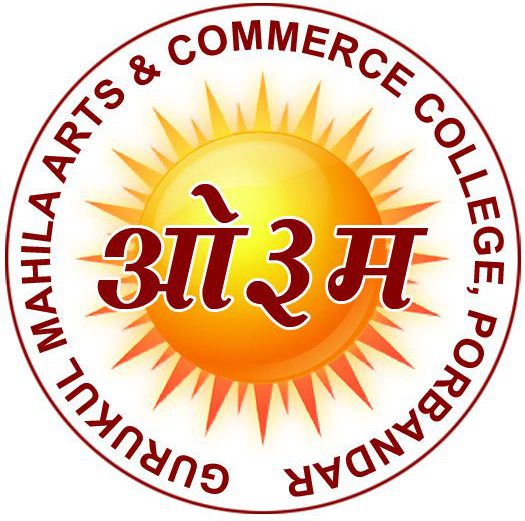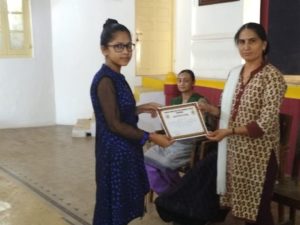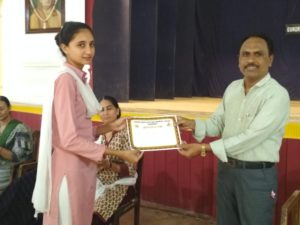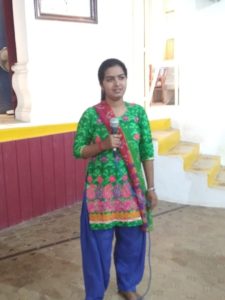Author: gurukulmahilacollege66
Code of Ethics
Preparatory Training for Competitive Examinations (STC) certificate distribution programme : 06.10.2018
Quiz competition and Exam: 02.10.2018
Vyaktitva Vikas Shibir by Vivekananda Kendra – Kanyakumari: 03.10.2018
Programme outcomes, Programme specific outcomes and course outcomes for all Programmes offered in Gurukul Mahila College of Arts & Commerce
The Institute has clearly stated learning outcomes of the Programmes and Courses. The following mechanism is followed by the institution to communicate the learning outcomes to the teachers and students:
- Hard Copy of syllabi and Learning Outcomes are available with the departments for ready reference for the teachers.
- Website links for the Soft Copy of Curriculum and Learning Outcomes of Programmes and Courses are also uploaded on the Institution website for ready reference.
- The importance of the learning outcomes has been communicated to the teachers in every IQAC Meeting and Departmental Meetings.
- The students are also made aware of the Programmes/Courses through Study-circle Meetings.
Course outcomes:
English:
- To introduce communicative skills, to define, classify, and understand the methods of communication, to improve LSRW skills; to enable them to practice those skills in their daily life by identifying instances of communication in the circumstances of their own.
- To familiarize students with the main events, conflicts, inventions and rich history of Great Britain.
- To comprehend literary texts of ancient and modern literature written by great writers of English.
- To become technically strong in different genres like Poetry, Novel, Essay, Short-story, Lyric, Ballad, Elegy, Tragedy, Comedy, tragicomedy, fiction, non-fiction, poetry, autobiography, biography, Journal, film, plays, editorials etc.
- To acquire good knowledge of critical/analytical frameworks and methodologies for better interpretation of literature. Students can apply critical frameworks to analyze the linguistic, cultural and historical background of texts written in English.
- To be acquainted with glossary of literary terms.
Hindi:
- Students can work anywhere in India, if they know Hindi – Our National Language. In many other countries also, Hindi is used as an Official Language as well as second Language. So they can easily be employed easily in those countries also.
- As Students are Practicing Translation from Hindi to Gujarati & English and Gujarati-English to Hindi, they can become Translators in many Central Govt. Offices. They are learning Poetry and Grammar – so they can become creative writers or poets.
- By Reading and observing Drama’s and one act plays/Skits they can become good actors. By having good communication skills and command over language one can become a good orator. By having good command over language one can present himself in a better way. Learning Hindi in a non-hindi region definitely helps in shaping one’s career.
Gujarati:
- Obtaining more information about one’s culture and tradition; encouraging creative writing and developing self-confidence.
- Aiming at enriching human excellence; increasing the level of comprehension and exercising communal harmony.
- Helping the students to know the basics of the language, Gujarati.
- Teaching various genres of Gujarati Literature to Gujarati students.
Home-Science:
Students inculcate an ability to apply knowledge of Home-Science which among others incorporates an ability to design, implement, and evaluate a fashion-designing system; food & nutrition; child development etc. In addition, Home-Science encourages students to function effectively as a team to accomplish a common goal. Students thus develop an ability to communicate effectively with a wide range of audiences. Quintessentially, Home-Science involves an ability to apply dietetics and nutrition principles in the making of responsible and health-conscious citizens.
Economics:
A degree in economics provides students with a solid foundation for a career in business, government, or a nonprofit organization. In this programme, students will study how societies, governments, businesses, households, and individuals create, use, manage and distribute resources. Economists are vital in helping predict and study responses to changes in policy and market changes, an important skill in today’s changing business environment. Economists also study and help develop public policies like health care and education reform. Our program will equip students with the skills to make better decisions in a business environment, on public policy, and even in personal choices.
Sociology:
The study of Sociology offers students the opportunity to develop a critical understanding of social processes and structures, so as to be able to live and work in our diverse global society and to apply the tools of social analysis to a broad range of professional, academic and community situations. The methods and knowledge developed by sociologists reflect the complexity of human organization, social life, inequalities and social justice. The newly emerging patterns of social change continue to alter our life, making the effective applications of social analysis more important than ever before in solving problems of inequalities, human organization and justice at a local and global level.
Commerce:
This program could provide well trained professionals for the Industries, Banking Sectors, Insurance Companies, Financing companies, Transport Agencies, Warehousing etc., to meet the well trained manpower requirements. The graduates will get hands on experience in various aspects acquiring skills for Marketing Manager, Sales, Over all Administration abilities of the Company.
- On successful completion of this subject the students acquire the knowledge about the various types of business organizations, office management and related subjects. The students learn the principles and concepts of Accountancy; practical applications of accounting; practical knowledge of marketing; Company Law; Management Accounting, Corporate Accounting, Income-Tax and Auditing.
- Commerce with computer Application gives a deeper understanding of both Information Technology and Commerce, thereby enabling the budding graduates to pursue careers in either of the two fast-growing areas, viz. IT Industry, Commerce, and Financial sector.
- Students of Commerce with CS demonstrate that they can present the results of their observations and research in a way that is objective, technically accurate, and legally acceptable. Students use effective technology appropriately, such as PowerPoint, slides, posters and handouts in oral presentations.
- Students of Commerce with CS have the Ability to apply the knowledge gained during the course of the programme from Mathematics, Basic Computing, and Social Sciences in general and all computer science courses in particular to identify, formulate and solve real life complex engineering problems faced in industries and/or during research work with due consideration for the public health and safety, in the context of cultural, societal, and environmental situations.














































































